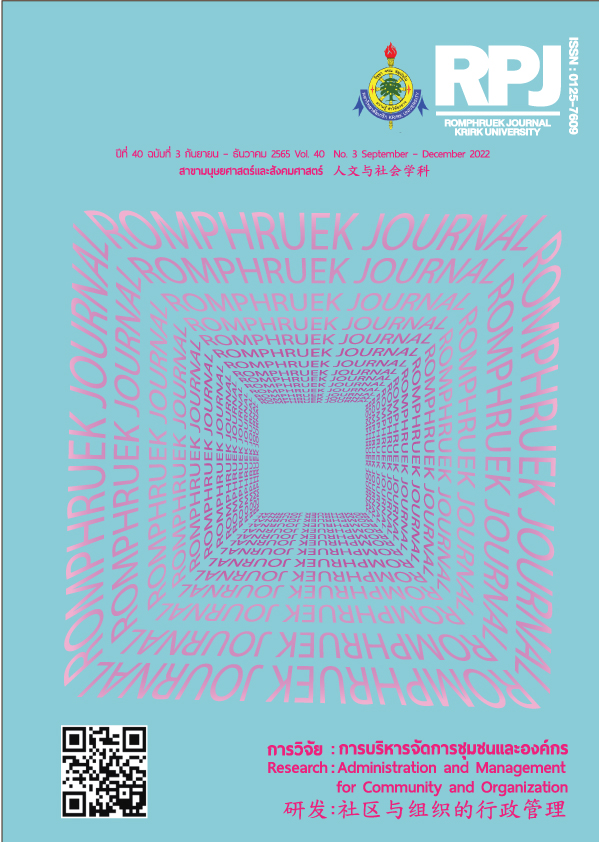Adaptation of Community-Based Tourism with Innovation Theory
Main Article Content
Abstract
The development of community-based tourism in Thailand is an important basis for Thailand's strong and long-term tourism development. Furthermore, the development has the potential to share income to all stakeholders. For the adaptation strategy, the communities combine the charming and distinctive tourism resources with the community creative management and government-supported concepts in order to support the policy of Thailand 4.0. Apart from focusing on administration, adopting technology will increase the community economic value. This article aims to examine the theories of innovation that are conducive to the adaptation of community-based attractions by introducing the five dimensions of innovative theories:product and service innovation, process innovation, marketing innovation, administrative, management, and organizational innovation, and business model innovation, for the adaptation of the community-based tourism to fit the tourist behaviors.
Article Details

This work is licensed under a Creative Commons Attribution-NonCommercial-NoDerivatives 4.0 International License.
Every article published in the Romphruek Journal of the Humanities and Social Sciences is the opinion and point of view of the authors. Thery're not the viewpoint of Krirk University or the editored department. Any part or all of the articles for pablication must be clearly cited.
References
กองทุนพัฒนานวัตกรรม. (2545). เพาะปลูกความคิด ให้ดอกผลทางเศรษฐกิจ. วารสาร MBA KKU, 4(38), 79.
คณะกรรมการนโยบายการท่องเที่ยวแห่งชาติ. (2562). เกณฑ์การพัฒนาการท่องเที่ยวโดยชุมชนของประเทศไทย. ม.ป.ท.
จีรนันท์ ศิวะโมกข์ลัคณา และ ไพวรินทร์ สืบบุก. (2563). มุมชวนคิดกับการท่องเที่ยวในอนาคต. (14 กันยายน 2564) สืบค้นจาก https://procurement.tcdc.or.th/en/Articles/Detail/RC-July-20.
ไชยยศ เรืองสุวรรณ. (2546). การบริหารสื่อและเทคโนโลยีทางการศึกษา. กรุงเทพฯ : วัฒนาพานิช.
ณัฏฐพัชร มณีโรจน์. (2560). การจัดการการท่องเที่ยวโดยชุมชน. วารสารวิชาการการท่องเที่ยวไทย
นานาชาติ, 13(2), 32.
ตลาดหลักทรัพย์แห่งประเทศไทย. (2562). นวัตกรรม : ความหวังใหม่เพื่อฟื้นฟูไทยกลับมา. (15 มิถุนายน 2564) สืบค้นจาก https://www.set.or.th/coverpage.html.
เติ้ง อ้ายหมิน และ ยุพิน อุ่นแก้ว. (2564). แนวคิดการท่องเที่ยวในพื้นที่กับแหล่งท่องเที่ยวโดยชุมชนในประเทศไทย. เอกสารการประชุมวิชาการ DPU International Conference on Business Innovation and Social Sciences 2021 วันที่ 19-21 พฤษภาคม 2564 ณ มหาวิทยาลัยธุรกิจบัณฑิตย์ กรุงเทพฯ, 387.
โตมร ศุขปรีชา. (2559). Localism & Staycation ที่สุดของการเที่ยวท้องถิ่น. จุลสารวิชาการการท่องเที่ยว, 2(3), 21-27.
พันธุ์อาจ ชัยรัตน์. (2550). การจัดการนวัตกรรมสำหรับผู้บริหาร. กรุงเทพฯ : งานส่งเสริมภาพลักษณ์องค์กร สำนักงานนวัตกรรมแห่งชาติ.
ศิริพรรณ ตันติวัฒนพันธ์. (2555). อิทธิพลของทรัพยากรเชิงเทคโนโลยี และเชิงพฤติกรรมต่อผลการดำเนินงานนวัตกรรมด้านผลิตภัณฑ์ และด้านกระบวนการขององค์การในประเทศไทย. บัณฑิตวิทยาลัย มหาวิทยาลัยรามคำแหง, กรุงเทพฯ.
ศุภชัย หล่อโลหะการ และคณะ. (2548). นวัตกรรม...คนไทยทำได้. กรุงเทพฯ : สำนักงานนวัตกรรมแห่งชาติ กระทรวงการอุดมศึกษา วิทยาศาสตร์ วิจัย และนวัตกรรม.
สมบัติ นามบุรี. (2562). นวัตกรรมและการบริหารจัดการ. วารสารวิจัยวิชาการ, 2(2), 129.
สำนักงานนวัตกรรมแห่งชาติ. (2549). สุดยอดนวัตกรรมไทย. กรุงเทพฯ : สำนักงานนวัตกรรมแห่งชาติ
กระทรวงการอุดมศึกษา วิทยาศาสตร์ วิจัย และนวัตกรรม.
สำนักงานนวัตกรรมแห่งชาติ. (2562). Innovation for the Future นวัตกรรมเพื่ออนาคต. กรุงเทพฯ : สำนักงานนวัตกรรมแห่งชาติ กระทรวงการอุดมศึกษา วิทยาศาสตร์ วิจัย และนวัตกรรม.
สำนักพัฒนาแหล่งท่องเที่ยว. (2550). คู่มือเครือข่ายการท่องเที่ยวโดยชุมชน. กรุงเทพฯ :สำนักงานพัฒนาการท่องเที่ยว กระทรวงการท่องเที่ยวและกีฬา.
Ahmed. P.K (1998). Culture and climate for innovation. European Journal of Innovation, 1(1), 30-43.
Dickman, S. (1996). Tourism : An Introductory Text. Sydney : Hodder Education.
Hijalager, A. M. (2002). Repairing innovation defectiveness in tourism. Tourism Management, 23(5), 465-474.
Nord and Tucker. (1987). Implementing Routine and Radical Innovations. MA : Lexington Books.
Oslo Manual. (2018). Guidelines for Collecting, Reporting and Using Data on Innovation. (7th ed). Paris : OECD Publishing; Luxembourg : Eurostat.
Schilling, M.A. (2008). Strategic Management of Technological Innovation. (2nd ed). NY : McGraw-Hill Education.
Schumpeter, J. A. (1942). Capitalism, Socialism, and Democracy. New York : Transaction Publishers.
Tidd, J., Bessant, J. & Pavitt, K. (2005). Managing Innovation : Intergrating technological, market and organization change. (3rd ed.) Sussex, UK : John Wiley & Sons.
Tushman, M.L. & Nadler, D. (1986). Organizing for Innovation. California Management Review, 28(3), 74-92.
Udwadia, F.E. (1990). Creativity and innovation in Organizations. Technological Forecasting and Social Change, 38(1), 66.


